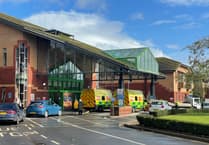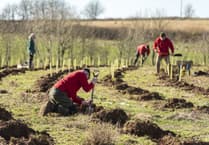Chagford Primary School children are using school dinner waste to make compost and planting hedgerows to become more environemntally responsible.
Last week (January 12), Chagford Primary School pupils each planted a sapling tree in the school grounds as part of a mission to create a hedgerow and teach the children environmental awareness.
Headteacher Ed Finch, said: ’The Devon Wildlife Trust has been working with the children for the half term and wanted a leave a mark. So the Trust managed to get hold of a tree for every child â about 150 children â to plant in front of a boring fence.
’It’s all trees like hazel, alder, crab apples â all the producing trees. It’s looking a bit bare at the moment but in four or five years it should start filling in.
’I told the children: we’re giving a gift to the future. We are very blessed to live where we do, surrounded by nature but not all parents have the time to spend in nature with their children.’
The school has also been working with local compost expert, Nicky Scott, dubbed Dr Compost, to reduce school food waste by using it to produce compost.
Mr Scott said: ’I have been involved with composting all my life and I have had a lifelong interest in it.
’When my children went to school I noticed there was a lot of food waste. I happened to work for Devon County Council and put forward a proposal to reduce the amount of school food waste. We provided every primary school in West Devon with composting equipment.
’Some no longer use it but with Chagford when the new school was built all the composting equipment was left in the long grass, so the school decided to start composting again and I came in to help.’
As part of the initiative, the school has invested in a Ridan composter, which the children can operate themselves.
Mr Finch said: ’A group of children collect the food waste and empty it into the composter. They then turn the handle and the waste goes through the belly of the beast and out comes compost.’
Mr Scott said the children were very excited by the scheme but they will have to wait some time before they can use their compost.
It takes approximately ten days for the waste to break down and the compost is then collected and placed into a special compost bin to mature for six to nine months.





Comments
This article has no comments yet. Be the first to leave a comment.